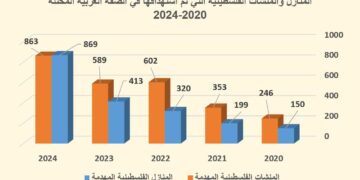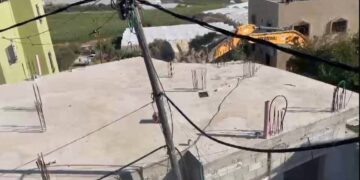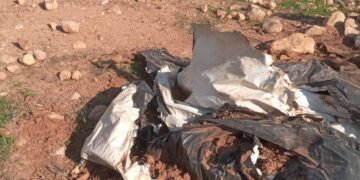- Violation: demolishing an agricultural room.
- Violation date: 17/09/2020.
- Location: Khallet Al-Zaitoun – Tarqumiya / Hebron Governorate.
- Perpetrators: the occupation “Civil” Administration.
- Affected party: citizen Muhammad Qaqour.
Violation details:
On Thursday, September 17, 2020, the Israeli occupation authorities demolished an agricultural service room owned by Mr. Mohammed Abdel Aziz Qaqour, under the pretext of building it without a permit, in the “Khallat Al Zaitoun” area, east of Tarqumiya town, Hebron governorate.
The area was raided by a force of the occupation army and the so-called border guards, accompanied by officers from the Organization and Construction Department of the so-called Civil Administration, along with a digger and a bulldozer. Up on arrival, the occupation soldiers surrounded the site, then, the machines began to demolish the room.
The demolished room is 36M2 built of tinplate installed on a concrete base and iron columns. It was built in 2019 on an 8-dunum plot of land owned by Mr. Qakour who used it for rest and as a store for hand tools and agricultural equipment. Before leaving the site, the attacking Israeli military force, also, demolished a brick bathroom and destroyed a 100 m3 mineral water tank.
On 17/05/2020, the occupation authorities issued a final order to stop work and demolish the room, under the pretext of un-licensing. The citizen was unable to prepare the file necessary for licensing, and to submit a legal objection to this matter, due to the occupation’s procrastination in granting him the “land registration document” which is basic for the submission of the file. This case comes within military order No. 1797 of 2018.
Military order No. 1797:
The Coordinator of Israeli Government Activities in the Occupied Territories (COGAT) issued military order 1797 on 17 April 2018. COGAT, under the direct control of the Israeli defense ministry, runs civil affairs in the occupied West Bank. Order 1797 went into effect on 19 June 2018.
This military order makes it possible for Israeli forces to demolish Palestinian homes deemed as “new” in Area C within 96 hours of a demolition order or removal notice being issued which “blatantly violate international law and contravenes existing local legislation.
According to the military order, “new structures” are those identified by an Israeli “Civil” Administration (ICA) inspector as having been built within the previous six months, or inhabited for less than 30 days prior to the removal notice. The only way to prevent the demolition is to produce a valid building permit or provide evidence that the targeted structure is not “new” within the meaning of the order.
The new order severely restricts the right to a hearing or the opportunity of appeal. According to the planning regulations applicable in Area C, the first enforcement measure against an unlicensed structure is a stop-work order, which gives the owner 30 days to object and try to obtain a building permit retroactively. If this fails, (COGAT) may issue a final demolition order, usually due for implementation within two to four weeks.
Military Order 1797 allows the Israeli Military Commander to summarily destroy Palestinian structures – including those provided as humanitarian assistance – with virtually no legal recourse available to those whose homes will be destroyed. No access to justice and no protection from grave breaches of IHL.
Military order says Palestinians have 96 hours to appeal house demolition
Even if Palestinians fulfill the appeal requirements put in place by military order 1797, Israeli authorities maintain complete authority to proceed with demolition.
Under the order, COGAT excuses itself from informing Palestinian homeowners directly that their homes are slated for demolition. The Israeli authorities only require demolition orders be placed “next to” relevant structures 96 hours before Israeli forces arrive to execute demolition. If a homeowner does catch wind of an impending demolition, he or she must present an approved master plan and building permit to appeal the demolition. Israel’s discriminatory housing policies in the West Bank ensure that this is an almost impossible requirement for the 300,000 Palestinians living in Area C, 60 percent of the West Bank, to fulfill. For example, between 2010 and 2014, Israel approves 1.5 percent of building applications in Area C. Israeli authorities, however, routinely approve of settlement master plans and even halt demolitions of settler outposts citing the existence of master plans. Indeed, since 2017 Israeli officials have approved nearly 14,000 settlement units in the West Bank.
In addition to having to produce an approved master building plan within four days, Palestinian residents of Area C attempting to forestall demolition must prove that construction on their home or home addition has been completed for six months or that the structure has been inhabited for thirty days.
By requiring that Palestinians produce so many documents in such a short period of time, this military order “virtually strips the affected residents of the right to due process and the capacity to challenge the demolition orders through legal avenues, by requiring that objections to the demolition order be accompanied with a valid building permit. Moreover, COGAT remains the sole arbiter of these appeals. Put differently, even if Palestinians fulfill the appeal requirements put in place by military order 1797, COGAT empowers itself to proceed with demolition anyway.
A glimpse on Tarqumiya town:
The town of Tarqumiya is located 10 km to the west of Hebron, and it is bordered to the north by the towns of Beit Ula and Beit Kahel, to the west by Idna town, to the east by Hebron city and Tafuh town, and to the south by the towns of Tafuh and Dora.
Its population is 19,311 people as of 2017. The total area of the village is 22,106 dunums, of which 2,117 dunums are a built-up area.
The total of 948 dunums of the town’s land was seized for the construction of the two following settlements:
- At least 442 dunums for Adora settlement established in 1982 and now inhabited by 191 settlers.
- At least 506 dunums for Telem settlement established in 1981 and now inhabited by 127 settlers.
Tarqumiya land classification by Olso agreement:
- Areas classified as B constitutes 37% equal to 8,186 dunums.
- Areas classified as C constitutes 63% equal to 13,920 dunums.











